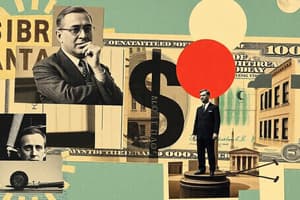Podcast
Questions and Answers
Goods - such as automobiles, electronics, or furniture - benefit from personalized sales, as do legal, financial, and ______ services.
Goods - such as automobiles, electronics, or furniture - benefit from personalized sales, as do legal, financial, and ______ services.
accounting
What effect does inflation have on currency?
What effect does inflation have on currency?
- It decreases its value (correct)
- It increases its value
- It doesn't affect its value
- Economists are still trying to figure this out
What are central banks, and what process allows them to increase the flow of currency?
What are central banks, and what process allows them to increase the flow of currency?
- Central banks are the institutions tasked with managing countries' economies, and they mint new money (correct)
- Central banks are local establishments that make loans to residents
- Central banks are digital money distributors that protect credit card companies
- None of the above
What is the main difference between panics and recessions?
What is the main difference between panics and recessions?
What is purchasing power?
What is purchasing power?
What is deflation, and how does it compare to inflation?
What is deflation, and how does it compare to inflation?
Flashcards
Inflation
Inflation
The decrease in value of currency, leading to higher prices.
Central Banks
Central Banks
Institutions that manage a country's economy and control money supply.
Minting Money
Minting Money
The official process of creating and releasing new currency.
Purchasing Power
Purchasing Power
Signup and view all the flashcards
Deflation
Deflation
Signup and view all the flashcards
Economic Panic
Economic Panic
Signup and view all the flashcards
Economic Recession
Economic Recession
Signup and view all the flashcards
Currency Circulation
Currency Circulation
Signup and view all the flashcards
Value System (Marbles Example)
Value System (Marbles Example)
Signup and view all the flashcards
Money and Prices Relationship
Money and Prices Relationship
Signup and view all the flashcards
Economic Control
Economic Control
Signup and view all the flashcards
Inflation Effects on Consumers
Inflation Effects on Consumers
Signup and view all the flashcards
Quantity Theory of Money
Quantity Theory of Money
Signup and view all the flashcards
Currency Value Over Time
Currency Value Over Time
Signup and view all the flashcards
Economic Downturn Indicators
Economic Downturn Indicators
Signup and view all the flashcards
Consumer Behavior During Inflation
Consumer Behavior During Inflation
Signup and view all the flashcards
Nominal vs Real Value
Nominal vs Real Value
Signup and view all the flashcards
Supply and Demand Impact
Supply and Demand Impact
Signup and view all the flashcards
Central Bank Policies
Central Bank Policies
Signup and view all the flashcards
Hyperinflation
Hyperinflation
Signup and view all the flashcards
Market Stability
Market Stability
Signup and view all the flashcards
Monetary Policy
Monetary Policy
Signup and view all the flashcards
Interest Rates and Inflation
Interest Rates and Inflation
Signup and view all the flashcards
Economic Growth and Money Supply
Economic Growth and Money Supply
Signup and view all the flashcards
Bartering vs Currency Use
Bartering vs Currency Use
Signup and view all the flashcards
Improvements in Productivity
Improvements in Productivity
Signup and view all the flashcards
Long-term Economic Planning
Long-term Economic Planning
Signup and view all the flashcards
Study Notes
Inflation
- Inflation is the decrease in the value of money relative to the overall quantity and production of goods.
- Increased world population leads to central banks creating more money, increasing circulation but decreasing the value of each unit.
- Central banks release more currency regularly to avoid panics, but this results in the value decreasing.
- Inflation can be understood by a value system, like trading marbles: many red marbles, fewer grey marbles, and even fewer green marbles, then tripling the red marbles to lose the value of the whole system.
Comprehension Questions
- Question 1: Inflation decreases the value of currency.
- Question 2: Central banks are institutions managing a country's economy and create new money.
- Question 3: Recessions are longer than panics, characterized by affordable prices. Panics are periods with anxiety over currency.
- Question 4: Purchasing power is how many goods/services currency can be exchanged for.
- Question 5: Deflation is a currency increasing in value due to a tight production schedule, opposite of inflation. Inflation is generally viewed as bad, while deflation is generally viewed as negative.
Studying That Suits You
Use AI to generate personalized quizzes and flashcards to suit your learning preferences.




